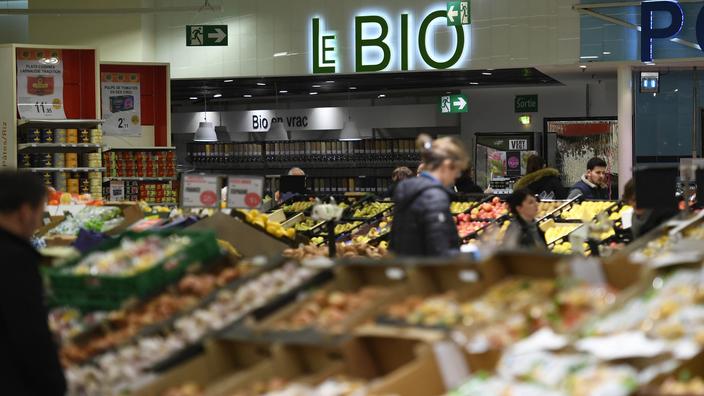Label bio
AB
at
Red Label,
the designation
DOP (
Denomination of Protected Origin
)
the words "
free range
" ... The messages of supposed information ensure the quality of food products to their impact on There are so many environments in which it can be difficult for the consumer to frankly assess what is going on behind valuable labels.
Read also In France, are conventional farmers more subsidized than organic farmers?
“
A review is needed
” for the giant defenders of consumers and the environment.
This Tuesday, September 28, the UFC-Que Choisir association, the NGOs WWF
,
Greenpeace France and the Basic analysis office published the results of two studies on the reliability and impacts of these food labels and associated approaches.
Faced with the mass of information on products in stores, the study leaders sought to assess the impact of these labels as a benchmark for purchase and their guarantees for consumers.
To do this, a first study by UFC-Que Choisir verified the compliance of the procedures with the defined requirements of the
SIQO
(official signs of quality and origin) - such as the
AOC / AOP, IGP, Label Rouge and AB
labels
- and analyzed the reasons for non-compliance of certain products.
The second study carried out simultaneously by WWF, Greenpeace and Basic concerns public and private approaches to assess environmental and socio-economic impacts.
Saint Nectaire, Cantal and Munster showcased
According to the first consumer association in France, some official signs of quality and origin studied do not actually meet their criteria. Supported by the National Institute of Agronomic Research, the consumer advocate studied the specifications of eight PDO cheeses, whose promise is "
the manufacture of a product made according to recognized know-how in the same geographical area
" and twelve Red Label meats which guarantee “
a product of superior quality
”
.
However, the report reveals that three cheese PDO out of the eight studied should not benefit from the appellation.
Thus Saint Nectaire, Cantal and Munster are singled out for being considered too close to industrial cheeses and not respecting the essential criteria which are: the minimum proportion of cows of local breeds, feeding the herd without fermented fodder and the ban on raw milk.
On the meat side, it is Label Rouge pork for which the differentiation with non-labeled pork would be too weak, unlike chicken, which ticks all the criteria and marks its difference from unlabelled chicken.
The criteria to be checked in order to obtain the label are also: the breed of animals, their diet, the outdoor range and the high slaughter age.
"
The bio comes out of the game
"
The second study carried out simultaneously by the Bureau of Societal Analysis Basic, Greenpeace and WWF concerns the socio-economic and environmental impact of eleven major initiatives, including: pillars of organic farming (organic farming
),
certification procedures environmental (
Agri Confidence
or
High Environmental Value ...)
and
AOP, Bleu Blanc Cœur or C'est Qui le Patron
certifications
. In this study, available online, the eleven approaches are subject to a completely new analysis grid comprising seven environmental criteria (climate change, air pollution, soil degradation, etc.) as well as seven socio-economic criteria rarely highlighted. for the question of food sustainability. These criteria include human health, animal welfare, working conditions and social cohesion.
What does this study tell us?
The cross-referencing of specifications analyzes and impact studies with data from labels and certifications results in a score between 1 and 5 representing “
the benefits of these approaches on socio-economic and environmental issues
”.
According to the study,
organic is therefore “
out of the game
” and obtains the “
strongest and most proven
”
socio-economic and environmental benefits
in terms of impact, in particular on human health.
On the other hand, on the environmental side, the High Environmental Value (HVE) reveals the most moderate impact on human health, biodiversity or water resources criteria with a score of 1 out of 5.
Read also Lactalis relaunches the battle for food scoring
Through the results of these studies, environmental defenders and consumers aim in particular to make public support conditional on the impact of the procedures and not on their initial intentions. Even if the study specifies that certain labels have revealed signs of quality and a positive impact, certification remains in the sights of Greenpeace France, WWF France and Basic who wish to condition its public support to a revised specification: certification HVE. The agricultural label is subject to debate among environmental defenders who do not consider it green enough and too accessible while farmers expect this more inclusive system. In addition, with the next CAP (period 2023-2027), HVE certification should allow organic farmers or farmers with certification to receive 76 euros per hectare,the highest level of the premium.

